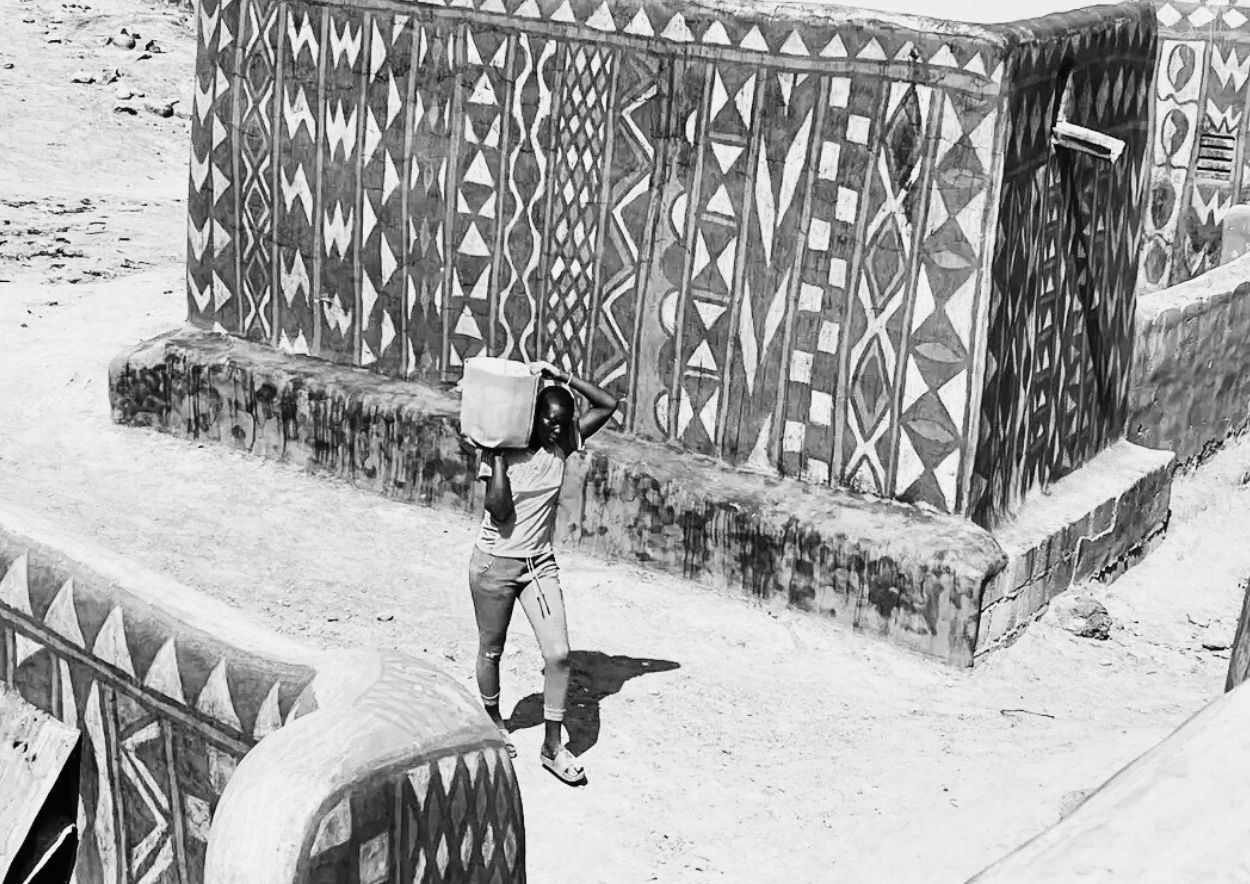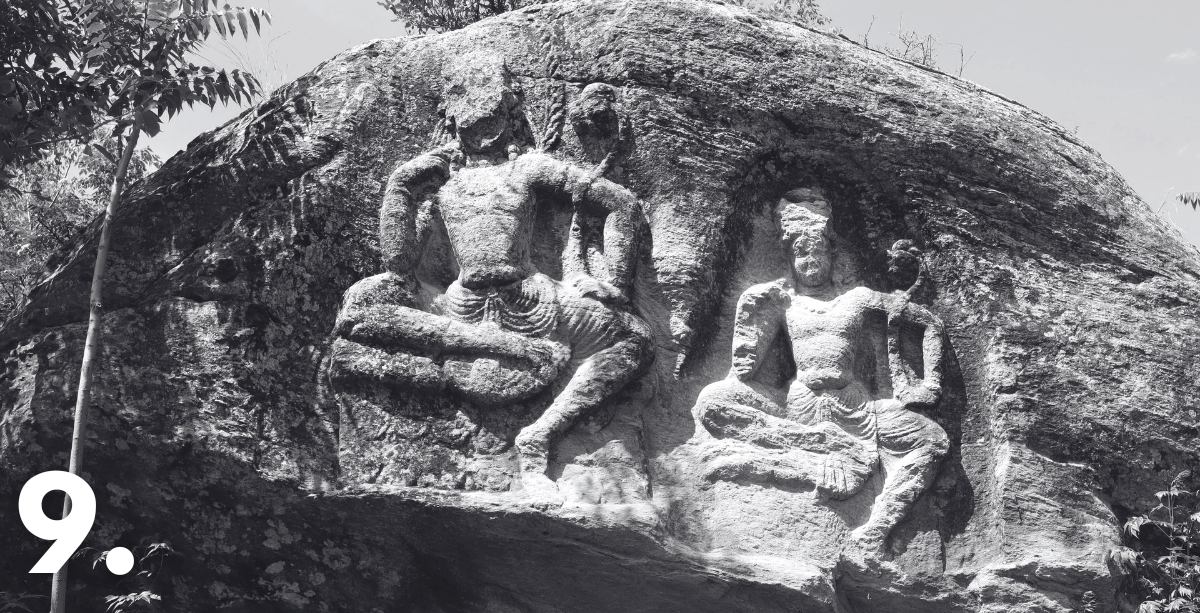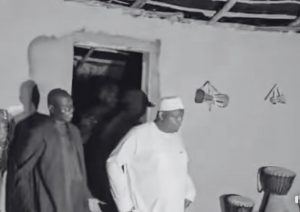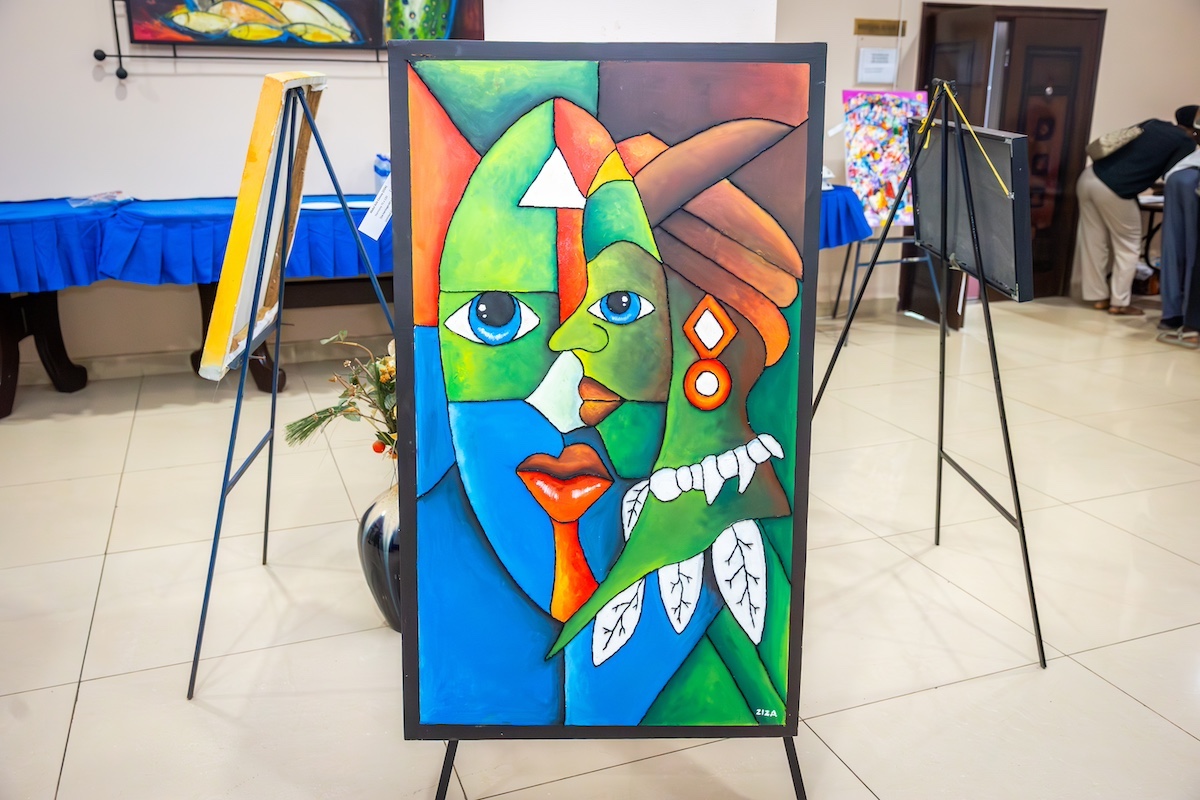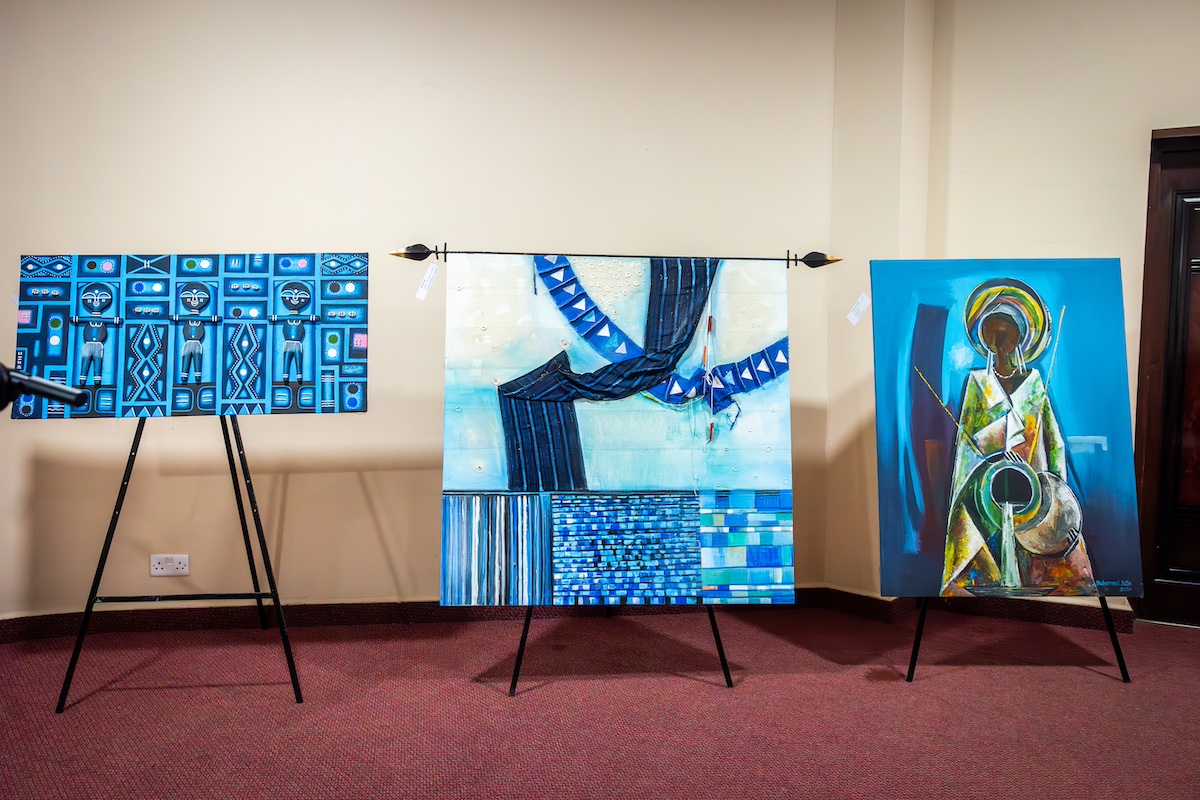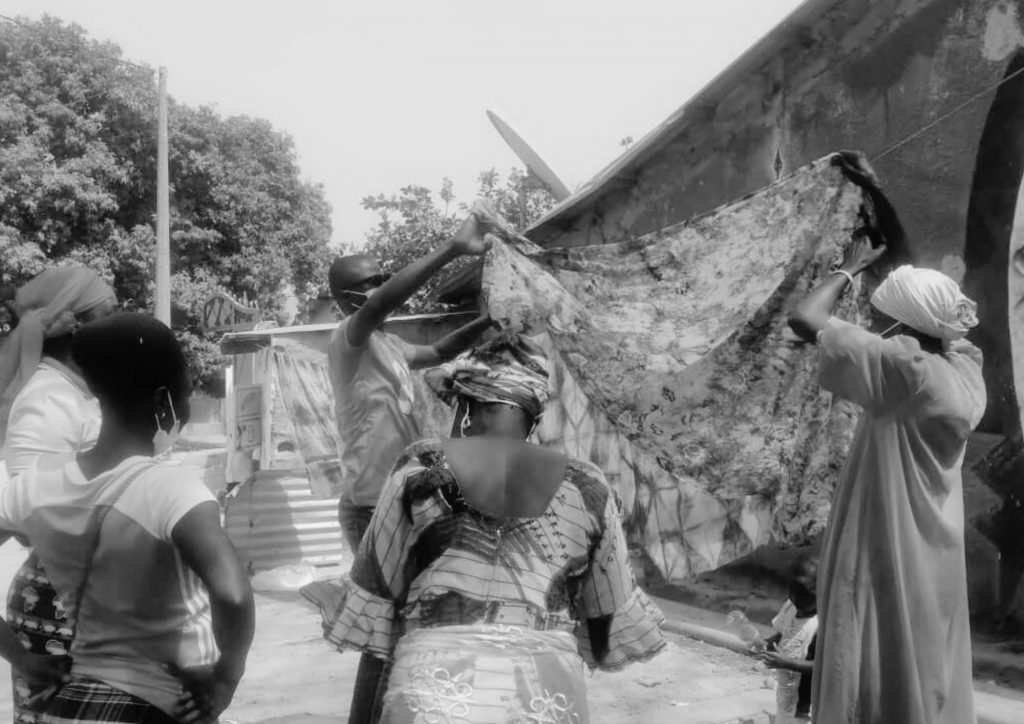: HerMaP Gambia
Sixth Online Networking Convening of Africa Grantees
On 10 December 2025, the HERITΛGE Africa Grants Team held the sixth online networking convening for grantees awarded in 2024. The meeting brought together grantees, HERITΛGE staff, members of the Re-granting Committee, representatives of the Mellon Foundation, and other African donors, with 45 attendees. After welcoming remarks by Richard A. Brown, seven grantees shared their projects. These ranged from documenting traditional boat-making in Mauritius and supporting cultural teaching in Senegal to safeguarding heritage industries in Sudan and revitalising museums in Chad and Ghana.
“Hearing the diverse experiences of colleagues across Africa reminded me that we are part of a wider heritage community, facing similar challenges, but also drawing inspiration and new ideas from one another.”
After the presentations, grantees’ refelcted on presenting their work and learning from one another. Participants discussed how the experience of sharing their projects encouraged them to reconsider elements of documentation, community engagement, and youth involvement in heritage work. Several grantees noted that hearing from others sparked new thinking about how to approach their own initiatives and opened possibilities for collaboration across contexts.
The sixth convening highlighted the strength of these gatherings in creating a space for peer learning, shared reflection, and mutual support, reinforcing HERITΛGE’s commitment to fostering heritage initiatives across Africa.
The participants and projects featured were:
-
Dr. Jayshree Mungur-Medhi, Mauritius: ‘Living the Heritage in Vieux Grand Port – Documentation and Transmission of Traditional Boat Making’
-
Abdoulaye Diao Noumounthi, Senegal: ‘ElleSolaire Cultural Academy’
-
Dr. Gafar Ali Fadol Ibrahim, Sudan: ‘Safeguarding Living Cultural Heritage in the Sudan at the Time of Conflict: Documentation of Cultural Industries (Pottery and Basketry) of Sinkat Locality in the Red Sea State’
-
Yaw Mankatah Asare, Ghana: ‘Abibikwantuo (AK) Indigenous Sustainability Hub’
-
Ngague Gaga Taguimbi, Chad (presenting on behalf of Ganda Bini Djabou): ‘Restoration and revitalization of the Sarh Museum’
-
Prof. Pastory Magayane Bushozi, Tanzania: ‘Conservation and Promotion of Cultural Sites in the Eyasi Basin, Tanzania’
-
Isaak Aduko, Ghana: ‘Protection, preservation and promotion of Fort Fredericksburg’
This was the sixth out of six planned events aimed at showcasing projects funded through our Small Grants for African Heritage Projects initiative, made possible through generous funding by the Mellon Foundation. 75 projects have received around $1 million in funding. You can read more about the specific projects on our Africa Grants page.
HERITΛGE 2025 Wrap-Up
In 2025, HERITΛGE continued to translate its mission of community-centred, inclusive, and sustainable heritage management into action across continents. From building local capacity across the world to advancing digital innovation and participatory practice in Europe and beyond, the year was defined by strong partnerships, expanded training, and tangible impact. HERITΛGE’s work in 2025 demonstrated how heritage can act as a driver of resilience, dialogue, and long-term social value, rooted in communities, connected globally, and oriented firmly toward the future.
1.The HerMaP Gambia successful completion
In February, HERITΛGE marked the successful completion of HerMaP Gambia, an initiative co-funded by the EU, by celebrating a milestone in community-driven heritage management. A certificate ceremony and visual art exhibition was held as part of The Gambia’s 60th Independence Anniversary celebrations, bringing together EU representatives, parliamentarians, and the Chair of the National Assembly to honour the dedication of the programme’s trainees. One week later, the Minister of Tourism, Members of Parliament, EU representatives, and a broad range of stakeholders convened for a high-level stakeholder lunch focused on sustaining the transformative results of the project. Already, we are seeing HerMaP Gambia graduates applying their new skills across the country—strengthening local heritage initiatives, engaging communities, and even training others. The programme’s impact is now firmly rooted in the sector, creating momentum that will shape heritage management in The Gambia for years to come.
2. HerMaP Africa: Building Capacity and Partnerships Across Three Countries
In 2025, HERITΛGE deepened its impact across Ethiopia, Ghana, and Rwanda through targeted capacity building, strategic partnerships, and close engagement with local cultural ecosystems, as part of the HerMaP Africa initiative supported by the Mellon Foundation. In Ethiopia, HERITΛGE delivered seven workshops and trained 127 participants, with a strong emphasis on hands-on, in-person conservation training. Notably, conservation workshops in Harar focused on equipping the next generation of staff from the Culture and Tourism Bureau with practical skills to safeguard this unique living heritage site, reinforcing long-term, community-based preservation. Institutional collaboration was further strengthened through the signing of two Memoranda of Understanding with key Ethiopian organisations. In Ghana, HERITΛGE delivered four workshops and trained 80 participants, ensuring broad regional representation and inclusive access to capacity building beyond major urban centres. A national networking roundtable brought together stakeholders and project leaders to exchange experiences, align priorities, and address shared challenges in the heritage sector, alongside the signing of two strategic MoUs. In Rwanda, four workshops trained 78 participants, and three MoUs were signed with leading institutions, including a milestone partnership with the Ministry of Youth and Arts. HERITΛGE also contributed to the Ubumuntu Arts Festival through programme consultations and a participatory session with young creatives, strengthening connections between heritage, contemporary culture, and youth engagement. Across all three countries, a dedicated Train-the-Trainers programme equipped 19 heritage professionals to act as HERITΛGE ambassadors, significantly amplifying local capacity and long-term impact.
3. Small Grants for African Heritage
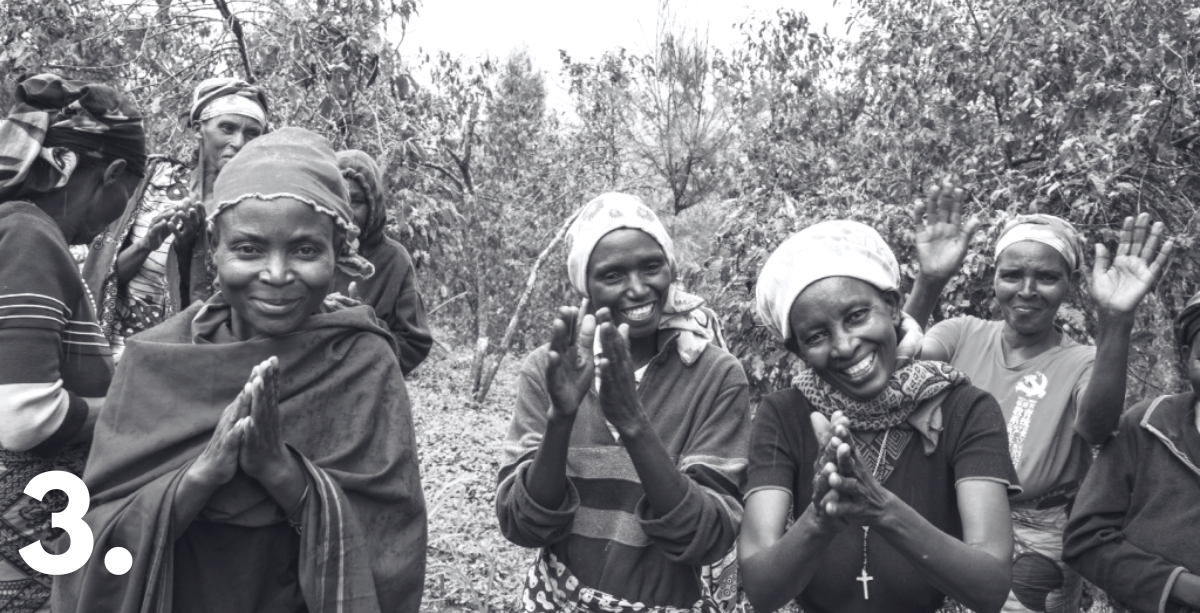 The regranting phase of HerMaP Africa reached its conclusion, marking one of the most ambitious and impactful heritage-support programmes on the continent. Since 2023, HERITΛGE has received more than 2,500 applications from across Africa and funded over 74 small heritage projects, each led by local actors working to safeguard, reinterpret, and activate their cultural heritage. This regranting initiative was made possible with the generous support of the Mellon Foundation. Throughout the year, grantees participated in six regional convenings, creating spaces to exchange experiences, strengthen their skills, and learn from peers—building a growing network of practitioners committed to community-centred heritage work. Several more convenings are planned for 2026 to continue nurturing this collaborative ecosystem. The results have been remarkable: from revitalised cultural practices to restored and more resilient cultural sites, to new opportunities for local development, these projects are already transforming lives. We are proud to showcase this work through dedicated social media features and a new publication that brings together the stories, challenges, and achievements of the HerMaP Africa grantees.
The regranting phase of HerMaP Africa reached its conclusion, marking one of the most ambitious and impactful heritage-support programmes on the continent. Since 2023, HERITΛGE has received more than 2,500 applications from across Africa and funded over 74 small heritage projects, each led by local actors working to safeguard, reinterpret, and activate their cultural heritage. This regranting initiative was made possible with the generous support of the Mellon Foundation. Throughout the year, grantees participated in six regional convenings, creating spaces to exchange experiences, strengthen their skills, and learn from peers—building a growing network of practitioners committed to community-centred heritage work. Several more convenings are planned for 2026 to continue nurturing this collaborative ecosystem. The results have been remarkable: from revitalised cultural practices to restored and more resilient cultural sites, to new opportunities for local development, these projects are already transforming lives. We are proud to showcase this work through dedicated social media features and a new publication that brings together the stories, challenges, and achievements of the HerMaP Africa grantees.
4. HerMaP Mexico: Launching a New Border Region Initiative
This year also marked the launch of HerMaP Mexico, a major new initiative that expands HERITΛGE’s work into North America and supports cultural heritage actors across Mexico’s northern border states. Funded by the Mellon Foundation’s Humanities in Place programme, the project brings a comprehensive, community-focused approach to heritage management through mapping, training, networking, and small grants. In 2025 we established the foundations of the programme: building local partnerships, initiating the mapping of heritage professionals and institutions across six states, and preparing the first round of capacity-building workshops to be delivered in both Spanish and English. HerMaP Mexico responds to the region’s unique cultural landscape—shaped by Indigenous, mestizo, migrant, and Chicano communities—and aims to strengthen local skills while creating new opportunities for collaboration and sustainable development. As the project moves forward, it will support locally led initiatives and grow into a long-term platform that connects heritage practitioners across the border region with global networks and resources.
5. Professional Training and Executive Leadership Education Programmes
HERITΛGE continued to strengthen its leadership in professional training by expanding its Executive Leadership Education programmes and reinforcing its global learning community. A key milestone was the introduction of Community Tourism and Development into the curriculum, responding to the growing need for heritage managers to understand how cultural resources can generate sustainable economic benefits while reinforcing social cohesion, identity, and community resilience. This year also saw the first alumni conference of the Engaging Communities in Cultural Heritage Summer School, bringing together former participants from around the world to share research, field experiences, and community-based practices. Alongside this, HERITΛGE successfully delivered its Conservation Series Training Programmes for the second time, expanding the offer to include First Aid for Finds and Preventive Conservation, and equipping participants with practical skills applicable across diverse heritage contexts. The Training of Trainers (ToT) programme continued to grow, building a global cohort of HERITΛGE Ambassadors—heritage professionals trained to deliver high-quality, cross-cultural capacity building within their own communities. Together, these initiatives reflect HERITΛGE’s ongoing commitment to community-centred heritage management, interdisciplinary collaboration, and the empowerment of professionals working at the intersection of culture, development, and sustainability, supported by a vibrant international network united by shared values and collective impact.
6. Advancing Audience-Centred Heritage Practice through AHEAD
In 2025, HERITΛGE advanced its work on audience-centred heritage practice through AHEAD (Accessible Heritage Experience for Audience Development), a project co-funded by Creative Europe and dedicated to strengthening participation, co-creation, and sustainability across the cultural heritage sector. At the Archaeological Museum of Messara, the project’s Greek hub, HERITΛGE hosted a series of co-creation labs in early 2025, followed by a study visit for AHEAD project partners in May, creating space for peer learning and in-depth exchange around participatory heritage approaches. In July, the 3rd AHEAD Networking Event brought together practitioners and researchers, and featured the presentation of the Living Heritage Network in Greece by Theodosia Maroutsi, highlighting how community-led approaches can be embedded in national heritage ecosystems. In September, HERITΛGE organised a dedicated Multiplier event in Athens to share the results of AHEAD with heritage managers, researchers, and cultural professionals. The project culminated in October with the presentation of AHEAD and its outcomes in Brussels and, for the Greek hub, a public event at the Archaeological Museum of Messara, where Elektra Angelopoulou, the project’s artist-in-residence, presented a site-specific artwork co-created with the local community. Alongside these events, AHEAD produced a dedicated magazine and learning resources that document the project’s insights and offer practical tools for fostering co-creation, inclusion, and long-term sustainability in cultural heritage practice.
7. SHIFT: Inclusive Digital Innovation for the Future of Cultural Heritage
HERITΛGE and its SHIFT consortium partners concluded this ambitious Horizon Europe project aimed at making cultural heritage more accessible, inclusive, and engaging through advanced technologies. Over its lifetime, SHIFT delivered a suite of innovative tools—including an Image-to-Video generator, affective speech synthesis, haptics interfaces, and a platform designed to support inclusive digital storytelling—alongside a pioneering Extended Reality (XR) Accessibility Framework. These results were tested and refined through four pilot events in Germany, Hungary, Romania, and Serbia, ensuring that the tools responded to real needs within museums, libraries, and cultural organisations. The project’s achievements were showcased at major gatherings such as the Digital Heritage World Congress and Expo in Siena, highlighting SHIFT’s contribution to the future of digital cultural heritage. As part of our commitment to long-term impact, HERITΛGE developed a set of training modules to equip cultural heritage professionals with the skills they need to adopt and apply these new technologies in their own contexts.
8. Strengthening a National Platform for Living Heritage
HERITΛGE strengthened its commitment to living heritage in Greece as a founding member of the country’s Living Heritage Network, with our Greek Programmes Manager, Theodosia Maroutsi, serving for the third year on its coordinating committee. In this role, HERITΛGE actively contributed to the Network’s 2nd National Meeting, held in Athens on 21–23 February, a major highlight of the year, where Theodosia welcomed participants and drove the dialogue during the “Living Heritage Network: Formation and Perspectives” roundtable “ reflecting on the Network’s development and future direction. HERITΛGE also delivered one of the leading side events of the 2nd National Meeting, a hands-on workshop, for 30 participants, titled “Working on the Narrative Interpretation of Living Cultural Heritage,” supporting practitioners in exploring narrative approaches to interpreting living heritage. Our impact extended well beyond the 2nd National Meeting’s floor. HERITΛGE was instrumental in drafting the Network’s Mapping Questionnaire, which was also launched in autumn of 2025. This Mapping is a crucial initiative designed to identify the essential needs of the living heritage ecosystem. The Network’s work was further amplified through HERITΛGE’s involvement in European projects: it was featured in AHEAD, where Theodosia participated in the 3rd Online Networking Event and was interviewed for the project’s magazine—freely available in English, Greek, Italian, and Spanish—and in EMPATHS, where the Network informed stakeholder mapping, cross-sector interviews, and co-design findings. Together, these activities positioned the Living Heritage Network as a key grassroots platform for participatory, community-led heritage practice in Greece and beyond.
9. Safeguarding Pakistan’s Most Significant and Vulnerable Cultural Landscapes
HERITΛGE and our partners completed the first phase of the project Preservation of Buddhist Rock Reliefs in the Swat Valley, safeguarding one of Pakistan’s most significant and vulnerable cultural landscapes. The initiative documented and conserved Buddhist rock carvings dating from the 8th to the 10th centuries, while also recording oral histories, legends, and traditional arts and crafts that link Pashtun culture with the Valley’s Buddhist past. Using advanced digital techniques, 78 rock reliefs were documented and made accessible through a public website featuring interactive maps and 3D models, and first aid conservation was carried out on 39 of the most at-risk sites. Capacity building was central to the project, with local participants trained in digital documentation and climate change adaptation. This first phase concluded with a public event at the Swat Museum and was presented internationally, including at the Lahore Museum, the Venice Biennale, and COP30, where it was cited as a strong example of heritage resilience in the face of climate change. Funded by the British Council’s Cultural Protection Fund and implemented with local and international partners, the project demonstrates how conservation, community engagement, and digital innovation can work together to protect heritage for future generations.
10. EMPATHS: Advancing Participatory Heritage Interpretation Across Europe
In 2025, HERITΛGE deepened its engagement in the Erasmus+–funded EMPATHS project, which aims to equip heritage professionals with the skills needed for participatory, community-driven heritage interpretation. Early in the year, the project contributed to international dialogue through a LDnet webinar on empowering local communities for smart and sustainable cultural heritage, while in May it published the EMPATHS Baseline Report, offering a comprehensive overview of current practices, challenges, and opportunities in participatory heritage interpretation across Europe and beyond. EMPATHS was further showcased at the European Association of Archaeologists (EAA) Congress in Belgrade, through the session “Voices of the Past, Hands of the Present: Collaborative Pathways in Archaeology and Heritage Interpretation.” In parallel, HERITΛGE led two online co-design sessions in Greece with heritage professionals from Alexandroupoli and Rizía, marking the project’s first structured dialogue between technical partners and piloting organisations and directly informing the design of the forthcoming training programme. Over the summer, EMPATHS published four key deliverables, including stakeholder mapping, cross-sector interviews, and co-design findings, all reinforcing the demand for skills in facilitation, storytelling, and emotionally resonant communication. The year culminated with the project’s second Transnational Project Meeting in Athens, where partners advanced work on the EMPATHS methodological compendium and training framework, the presentation of the project during a Global Alliance for Heritage Interpretation Webinar, and, importantly, with the publication of the EMPATHS Manifesto—a collective call to move beyond top-down interpretation and embrace heritage as a shared, democratic, and future-oriented process shaped with communities.
11. Community-Led Preservation of Earthen Architecture in Shibam, Yemen
In Yemen, HERITΛGE advanced a major effort to safeguard the cultural heritage of Shibam through the ALIPH-funded project Preserving the Unique Earthen Architecture of Shibam. In early 2025, museum experts Shatha Safi and Khulod Najjar travelled to the UNESCO World Heritage city to guide the community-led planning of a new museum that will bring together collections currently scattered across Shibam and create dedicated spaces for traditional arts, crafts, and digital learning. Their visit marked a pivotal moment in the project, with consultations held with local authorities, heritage institutions, and women from the community to ensure the museum reflects the lived experiences, history, and aspirations of Shibam’s residents. Alongside this vision-setting, HERITΛGE is training local professionals on-site, with four trainees already working with our team on the documentation of the South Palace—future home of the museum. Complemented by architectural assessments and a climate action study, the project is laying the groundwork for a resilient cultural hub that will support preservation and community engagement for years to come.
12. Safeguarding Architectural Heritage in Times of War in Ukraine
In Ukraine, HERITΛGE advanced critical work to protect architectural heritage threatened by war through the project Architectural Heritage Preservation in Times of War: The Ukrainian Model, delivered with the Kharkiv School of Architecture and 3D documentation specialists Skeiron. Launched in September 2024, the programme trained 30 students and 10 educators from across the country in cutting-edge documentation and conservation techniques—from photogrammetry and 3D laser scanning to international heritage standards—while providing hands-on field internships in Western Ukraine. Together, they created high-resolution digital records of 15 at-risk sites, safeguarding knowledge even as physical structures remain vulnerable. Through educator training and a series of public webinars, the project also planted the seeds for a new nationwide curriculum in architectural heritage preservation. Its impact extends far beyond a single academic year: it has built a cohort of young architects and teachers equipped with the skills, networks, and resolve to protect Ukraine’s cultural memory during conflict and beyond. Their work stands as a reminder that preserving heritage is not only an act of conservation, but an act of resilience and recovery.
13. New Projects for the Digital Transformation of Cultural Heritage
 In 2025, HERITΛGE became a consortium partner in two new projects funded under the EU’s Horizon Europe programme, both contributing to the ECHOES initiative and the development of the European Collaborative Cloud for Cultural Heritage (ECCCH). ECHOES aims to establish a shared digital infrastructure that brings together currently fragmented cultural heritage communities, offering access to data, advanced digital tools, scientific resources, and training materials developed collaboratively by heritage professionals and researchers. HERITΛGE participates in MusicSphere, a project dedicated to preserving and interpreting traditional musical organs—such as pipe organs and their ancient Greek counterpart, the hydraulis—through high-fidelity digital replicas, acoustic modelling, and immersive virtual and augmented reality experiences that capture both their physical structure and sonic interaction with architectural spaces. HERITΛGE is also a partner in EXCALIBUR, which focuses on burial sites, excavation contexts, artefacts, and human remains, developing human-centred, affordable digital twin technologies to support research, conservation, restoration, and museum interpretation. Together, these projects contribute to the long-term preservation, study, and public understanding of complex heritage assets, while ensuring that open, interoperable, and practitioner-driven tools are shared through the ECCCH platform for broad professional and societal impact.
In 2025, HERITΛGE became a consortium partner in two new projects funded under the EU’s Horizon Europe programme, both contributing to the ECHOES initiative and the development of the European Collaborative Cloud for Cultural Heritage (ECCCH). ECHOES aims to establish a shared digital infrastructure that brings together currently fragmented cultural heritage communities, offering access to data, advanced digital tools, scientific resources, and training materials developed collaboratively by heritage professionals and researchers. HERITΛGE participates in MusicSphere, a project dedicated to preserving and interpreting traditional musical organs—such as pipe organs and their ancient Greek counterpart, the hydraulis—through high-fidelity digital replicas, acoustic modelling, and immersive virtual and augmented reality experiences that capture both their physical structure and sonic interaction with architectural spaces. HERITΛGE is also a partner in EXCALIBUR, which focuses on burial sites, excavation contexts, artefacts, and human remains, developing human-centred, affordable digital twin technologies to support research, conservation, restoration, and museum interpretation. Together, these projects contribute to the long-term preservation, study, and public understanding of complex heritage assets, while ensuring that open, interoperable, and practitioner-driven tools are shared through the ECCCH platform for broad professional and societal impact.
Gambia President visits Jufureh museum supported by HERITΛGE
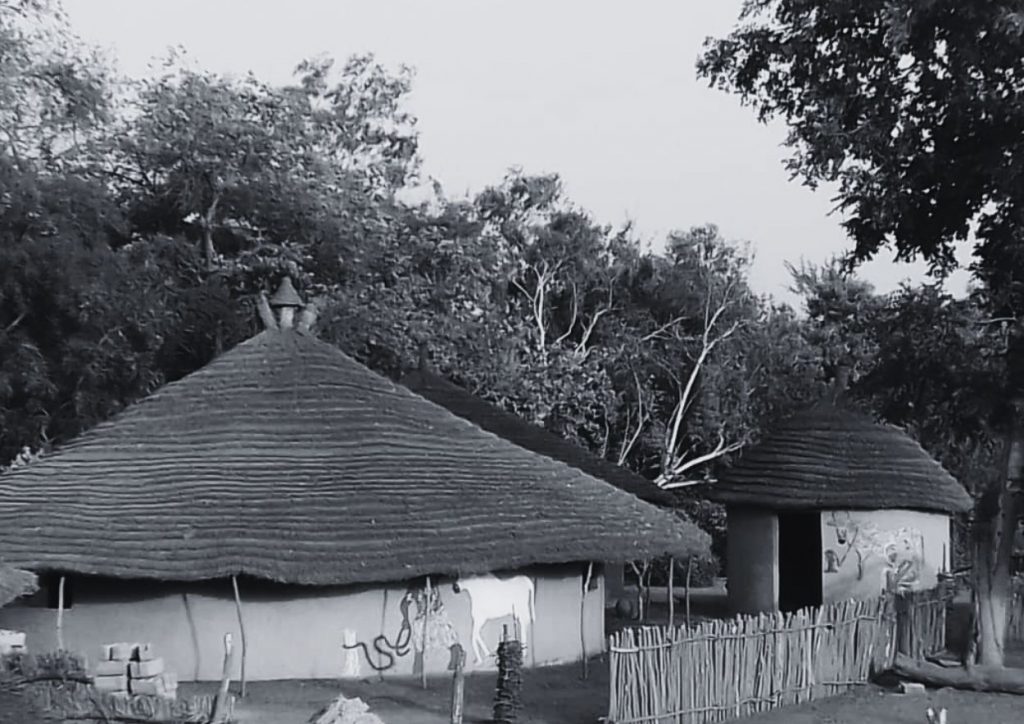 In a strong show of support for the preservation of The Gambia’s cultural heritage, His Excellency President Adama Barrow visited the Jufureh Heritage Village Museum in the North Bank Region. The visit marks a proud moment for HERITΛGE, as the new museum has been made possible with funding from our Small Grants for African Heritage funded by the Mellon Foundation—and our HerMaP Gambia initiative, funded by the European Union.
In a strong show of support for the preservation of The Gambia’s cultural heritage, His Excellency President Adama Barrow visited the Jufureh Heritage Village Museum in the North Bank Region. The visit marks a proud moment for HERITΛGE, as the new museum has been made possible with funding from our Small Grants for African Heritage funded by the Mellon Foundation—and our HerMaP Gambia initiative, funded by the European Union.
The Jufureh Heritage Village Museum, developed by the Alamanding Foundation, is a community-driven initiative dedicated to safeguarding traditional knowledge, skills, and stories for future generations. More than a space for preserving artefacts, it serves as a living museum—a place where culture thrives through civic education, environmental awareness, artisan workshops, and storytelling gatherings at Banta Baa, a communal hub for cultural exchange.
At the heart of the project is the construction of a traditional Mandinka homestead, built using local materials and techniques that reflect the authenticity of rural Gambian life. The homestead complements an already completed Fulani compound, together forming a vibrant cultural complex that celebrates the shared heritage of the Mandinka and Fula communities of the Niumi District.
The initiative also supports sustainability and community empowerment. A solar-powered borehole has been installed to provide clean water and electricity to the site, ensuring that the museum operates in an environmentally responsible way. Meanwhile, 12 local stakeholders—including tour guides, museum staff, and tourism officials—have been trained by HERITΛGE in oral history collection, heritage interpretation, and cultural tourism marketing.
These activities are already generating impact. The museum has become a focal point for visitors seeking deeper engagement with Gambian heritage and for locals who see their traditions valued and sustained.
HERITΛGE is proud to have contributed to a project that not only preserves heritage but also creates opportunities, strengthens local identity, and demonstrates the power of community-led action. President Barrow’s visit is a testament to the national importance of such efforts and to the shared vision of building a more inclusive and sustainable future for heritage in The Gambia.
You can now visit the museum and find out more about Jufureh’s heritage. Find out more here.
*HERITΛGE’s Small Grants for Africa Initiative is supported by the Mellon Foundation’s Humanities in Place program. This project has also received funding from EU-funded HerMaP Gambia.
Training Artists, Telling Stories: HERITΛGE and VAAG Sign MoU in Banjul
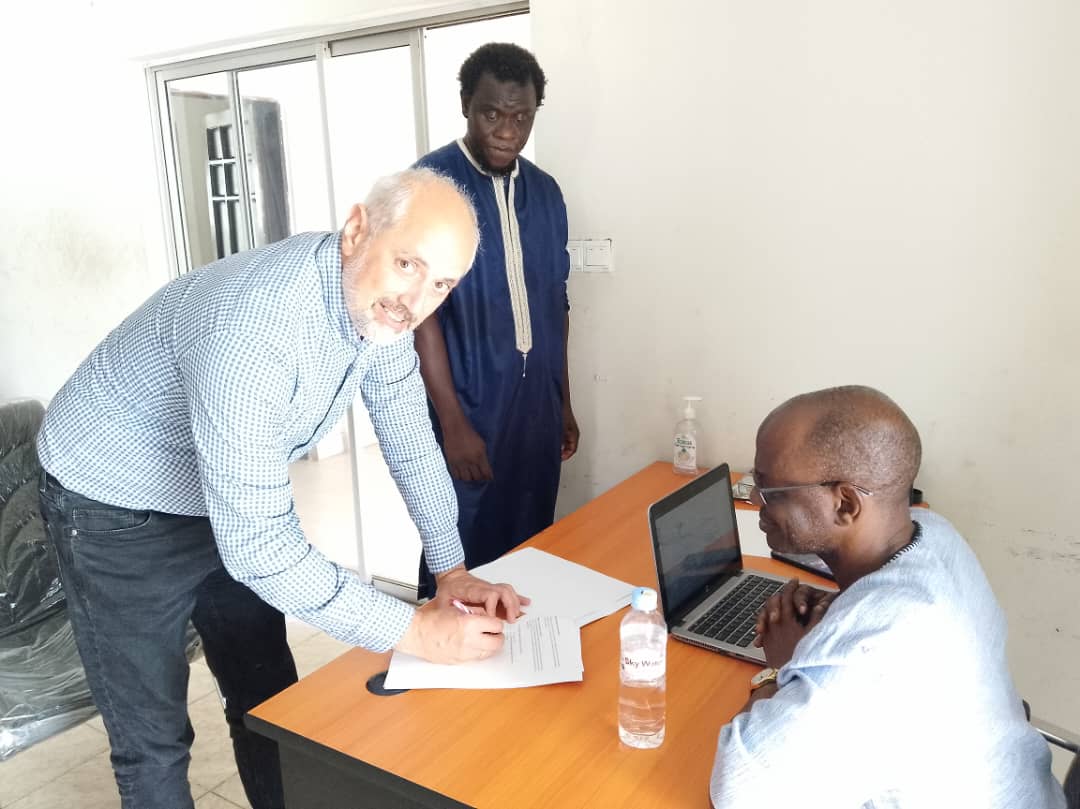 On Friday, July 18, The Heritage Management Organization (HERITΛGE) took another step forward in supporting The Gambia’s vibrant arts community by formalizing a partnership with the Visual Artist Association of The Gambia (VAAG) at the NCAC Pipeline Offices in Banjul.
On Friday, July 18, The Heritage Management Organization (HERITΛGE) took another step forward in supporting The Gambia’s vibrant arts community by formalizing a partnership with the Visual Artist Association of The Gambia (VAAG) at the NCAC Pipeline Offices in Banjul.
Dr. Evangelos Kyriakidis, Director of HERITΛGE, led a master class called “Telling Heritage Stories Through Art” for VAAG members. The session explored how visual art can become a bridge between past and present, helping communities preserve their stories while making them relevant for new generations.
The gathering drew important voices from The Gambia’s cultural landscape, including Mr. Hassoum Ceesay, Director General of the National Centre for Arts and Culture (NCAC), who emphasized the value of bringing together local institutions with international partners to strengthen heritage education.
By the end of the day, Mr. Modou Lamin Jatta, Chairman of VAAG, and Dr. Kyriakidis had signed a Memorandum of Understanding that opens doors for ongoing collaboration. The partnership promises more training opportunities, exhibition development, and chances for Gambian artists to share their heritage-inspired work with international audiences.
The collaboration is already showing results. This past February, VAAG organized a visual art exhibition during the HerMaP Gambia Certificate Award Ceremony, which marked The Gambia’s 60th Independence Anniversary. The exhibition showcased how contemporary artists are interpreting their nation’s story and contributing to conversations about identity and cultural memory.
HERITΛGE looks forward to continuing this work with VAAG and other local partners, creating spaces where heritage and creativity intersect. Together, they’re building platforms for artists to explore their history, connect with their communities, and imagine new possibilities for the future.
Community-Based Heritage Skills Training in Galloya: A Case Study in Women’s Empowerment through Traditional Textile Arts
At HERITΛGE we are happy to see our work create a lasting impact. We are particularly pleased to share a new initiative in The Gambia, the Galloya Street Art Tie & Dye and Batik Training for Women’s Empowerment, organised by Malick Kujabi. Malick is our focal representative in The Gambia and a HERITΛGE trainee himself. He has completed the Training of Trainers (ToT) programme, that HERITΛGE delivered to 30 individuals in the framework of HerMaP Gambia, an initiative to up-skill the country’s heritage, tourism, and sports sectors, co-funded by the European Union.
Malick’s recent training initiative is an inspiring example of how traditional craft skills can be mobilized to promote both cultural continuity and socio-economic development.
Project Overview
Implemented over a three-week period in the village of Galloya, close to the capital Banjul, the training focused on equipping 10 women with practical skills in Tie & Dye and Batik—textile techniques deeply rooted in West African visual culture. The workshop was structured around both technical instruction and applied learning, progressing from basic fabric preparation and design to advanced dyeing techniques, product finishing, and business development.
The training culminated in a community exhibition that not only served to showcase the participants’ work but also reinforced the social value of the craft within the broader community.
The initiative aimed to preserve and transmit traditional textile techniques, foster women’s economic empowerment through skills development, encourage entrepreneurship at the community level, and promote wider community engagement through participatory arts practices.
The training approach combined hands-on instruction with peer learning and included sessions on product design, branding, and marketing strategies. This integration of heritage practices with entrepreneurial training reflects a growing recognition of the role of cultural heritage in sustainable development frameworks.
Sustainability was at the core of the project design. Beyond the immediate training, participants will receive ongoing mentorship aimed at supporting micro-enterprise development. Plans are also underway to facilitate the formation of a cooperative to provide long-term support, market access, and collective visibility for the women’s products.
“This case highlights the potential of grassroots training initiatives to link cultural heritage preservation with social and economic development,” said Denise Navarro, HERITΛGE project manager for The Gambia. “The Galloya workshop demonstrates how ToT programmes can enable participants not only to internalise heritage practices but also to adapt and transmit them in ways that meet present-day needs.”
Transformational HerMaP Gambia project wraps up with an eye to the future
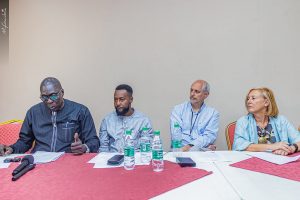
From Left to Right: The Gambia’s Tourism and Culture Minister, The Honourable Abdoulie Jobe, The Honourable Member of The Gambia’s National Assemnly Omar Jammeh, HERITΛGE Director Dr. Evangelos Kyriakidis, EU Head of Co-operation in The Gambia, Enrica Pellacani.
HERITΛGE has completed its transformational HerMaP Gambia project to upskill and help grow The Gambia’s cultural, tourism and sports industries with funding from the European Union. To celebrate the project’s achievements, take stock of progress and challenges and map out the next steps, a stakeholder event was held on February 24th in Banjul in the presence of The Honourable Abdoulie Jobe, Minister for Tourism and Culture.
“The future of HerMaP Gambia is for all of you to shape. Government, civil society, and the private sector must work together to safeguard The Gambia’s cultural heritage and transform it into a pillar of national pride and prosperity,” HERITΛGE Director, Dr. Evangelos Kyriakidis, told participants including members of parliament, representatives of the country’s National Centre for Arts and Culture (NCAC), the Gambia Tourism Board, the Institute for Travel and Tourism of The Gambia, the country’s foremost festivals and a series of cultural heritage projects.
Since its launch in 2020 HerMaP Gambia, that was co-funded by the EU, has: empowered over 250 individuals through capacity-building initiatives in 18 workshops, trained more than 30 trainers and supported 10 key cultural heritage initiatives, including the enhancement of the Fort Bullen Visitor Center, the creation of the Fulani Mud House Museum, and the revitalization of Juffureh Village Museum. An office has been established in Barra North Bank and a Study Tour was organized for the National Assembly’s Committee on Tourism, Culture and Sports in the framework of the program. HerMaP Gambia is also playing a crucial role in documenting and promoting The Gambia’s Intangible Cultural Heritage (ICH) with HERITΛGE hosting The Gambia’s ICH Register on its website.
As the project concludes, its impact will continue to inspire heritage managers and cultural entrepreneurs, ensuring The Gambia’s rich heritage is preserved and serves as a catalyst for sustainable growth.
As Enrica Pellacani, Head of Co-operation for the Representation of the EU in The Gambia pointed out “By protecting cultural heritage sites and museums, the government will be able to attract more tourists to these sites and this will encourage growth other related areas such as the production of local artisanal souvenirs, the hospitality industry, the tour guide sector, a whole ecosystem that can benefit from culture.”
A few days earlier, HerMaP Gambia had honoured its trainees during a Certificate Award Ceremony. Read more about this event here.

